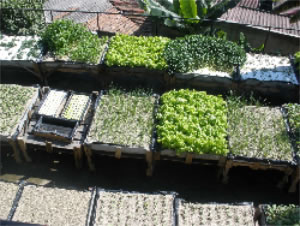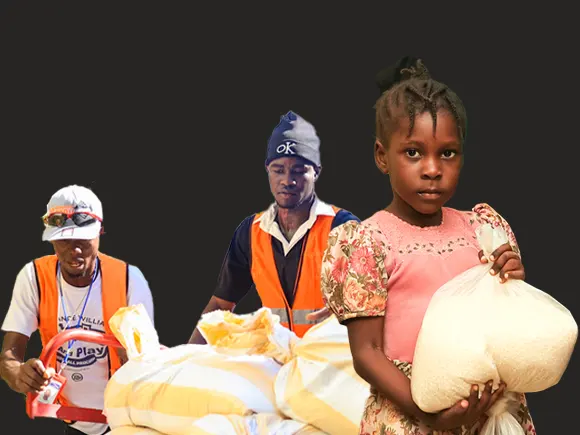Hope Grows in El Salvador Gardens
COCONUT CREEK, Fla. (March 26, 2010) – Seven gardens in seven Food For The Poor orphanages in El Salvador are adding up to lush vegetables for the dinner table, as well as providing an even more important crop for the children who live there – one of hope.
By any measure, these are not ordinary gardens. They are hydroponic masterpieces engineered by partner organization New Horizons for the Poor Foundation, and planted and nurtured by the staff and children at the Angels of Hope homes. Because crops can be continually planted and harvested, the gardens supply a steady flow of nutrients for the children through tomatoes, cucumbers, peppers, lettuce greens, cauliflower and broccoli.
“One of the best things we can provide for the poor is a source of sustainable food, and a method by which they can transform their lives,” said Robin Mahfood, President/CEO of Food For The Poor. “These gardens are a blessing to the children’s lives, just as the food graces their dinner plates each night.”
Before the first seed is planted, the home director and a staff member join two children from the home at training workshops. The elevated boxes are then built and planted and a garden equal to about 210 square feet emerges from the terrain. After that, the crops start to come in and the children are as proud of their tomatoes as any backyard gardener.
But there’s a bigger story to the gardens. There is one small home that serves as a haven for about 10 boys who have been on the streets addicted to drugs, involved in illegal activities, and selling their souls to survive. Time here is marked before the garden and after the garden.
Before the garden was planted, the boys in the home had little contact with their community. They were feared by some neighbors, and looked down upon by others. Then they planted, and the vegetables flourished. They found that after the harvest, they had a surplus of food and they began to bundle it and offer it for low prices to neighbors. They began to be embraced, with those living nearby seeking them out to buy fresh food. In a year’s time, people who had turned their heads away from them now reached out to them instead.

This innovative method of using hydroponics has provided a sustainable source of food for more than 300 children, a stream of income that helps cover the operating expenses for the homes, and a bridge to a broader community.
“This is evidence that a small investment in a child’s life can have tremendous returns,” Mahfood said. “This is not about one meal, but about a gift for a lifetime.”
The children in Food For The Poor’s Angels of Hope program depend on generous sponsors for their survival. The cost of sponsorship is $34 a month – about $1.13 a day. When you sponsor a child through Angels Of Hope, Food For The Poor will send you a brief biography of the child, photos, a map and a fact sheet about the child’s home country.
All gifts are tax-deductible. To sponsor an orphan, visit foodforthepoor.org/help/angelshope. To learn more about the Angels of Hope homes, visit the blog.
Food For The Poor, the largest international relief and development organization in the United States, does much more than feed millions of hungry poor in 17 countries of the Caribbean and Latin America. This interdenominational Christian agency provides emergency relief assistance, clean water, medicines, educational materials, homes, support for orphans and the aged, skills training and micro-enterprise development assistance, with more than 96 percent of all donations going directly to programs that help the poor. For more information, please visit www.foodforthepoor.org.
Contact:
Kathy Skipper
Marketing and Public Relations Manager
954.427.2222, ext. 6614
kathys@foodforthepoor.org
